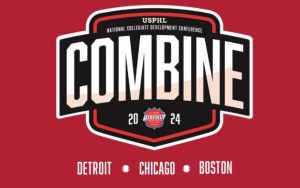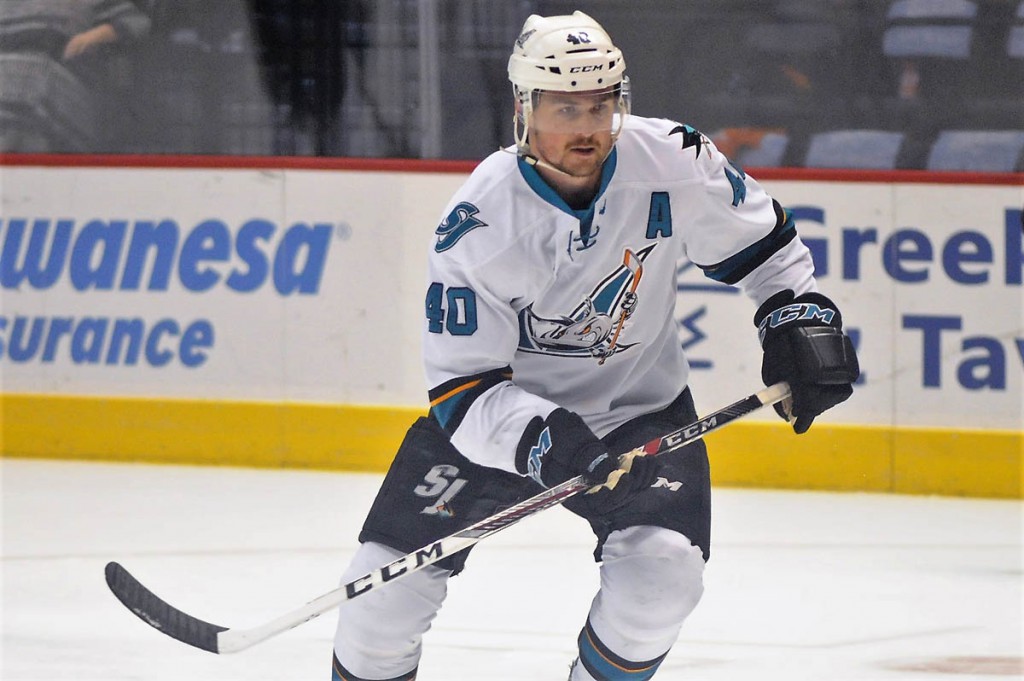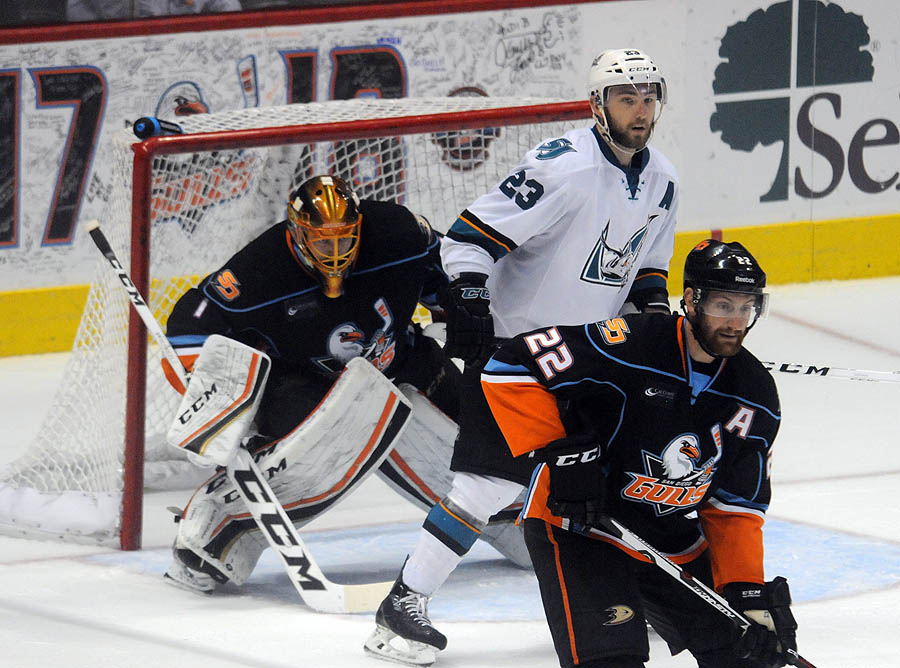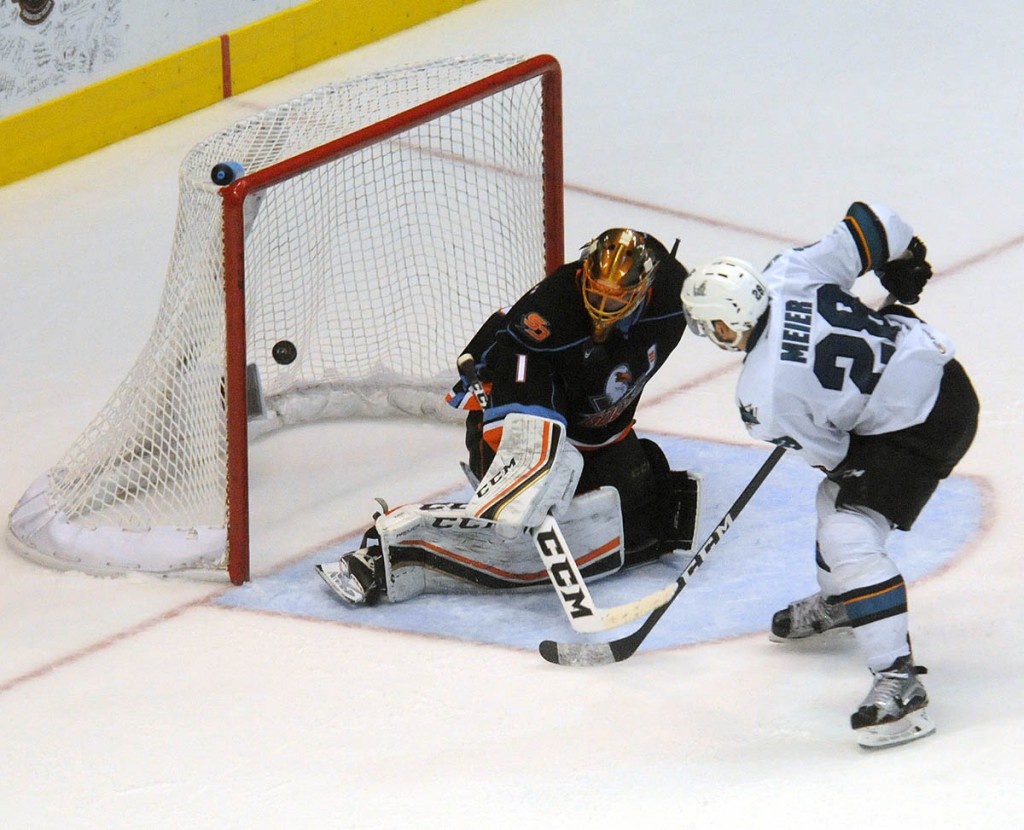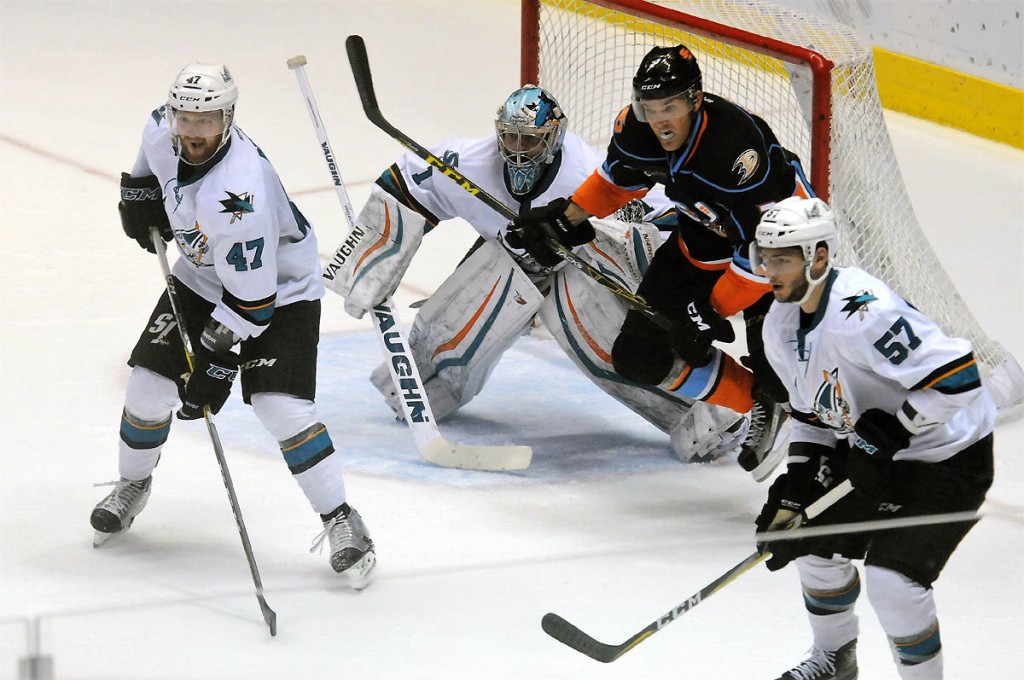Barracuda eliminates Gulls, off to AHL’s Western Conference Finals

The San Jose Barracuda is going to where no other Barracuda team has gone before: the American Hockey League’s (AHL) Calder Cup Western Conference Finals.
The top-seeded Barracuda took a bold new step into previously unchartered territory by defeating the second-seeded San Diego Gulls four games to one in the teams’ best-of-seven Pacific Division Finals.
San Jose will now engage the Central Division Finals champion Grand Rapids Griffins in the best-of-seven Western Conference Finals. The Barracuda will host the opening two games in the series May 20-21 at the SAP Center.
This marks the first time in Barracuda head coach Roy Sommer’s 19-year tenure guiding a Sharks AHL affiliate that he has led his team this far in the Calder Cup playoffs.
“It’s been a long time coming,” admitted Sommer, an Oakland native and the 2016-17 AHL Coach of the Year. “You’ve got to have breaks, you’ve got to play the right teams. You look at these guys (the Gulls) … Maybe it’s a different series if they have some key guys down from the Ducks. The Ducks are still in the Stanley Cup Playoffs and the Sharks are out. So far, it seems we’ve been making our own breaks.”
The Barracuda hosted the opening two games in the Pacific Division Finals. The visiting Gulls stole a 3-2 overtime win in Game 1 on May 5 to take a quick 1-0 lead in the series between the two California teams.
However, San Jose won the next four games to win the series, including all three games played in the Gulls’ home nest at the Valley View Casino Center.
The Barracuda evened the series at a win apiece by capturing a 5-1 victory at the SAP Center on May 6.
The series then shifted to San Diego. San Jose won Game 3 by a 4-3 score in overtime on May 10 to capture the key swing game and dictate the rest of the series.
The Barracuda wrapped up the division championship with a 4-3 win in Game 4 on May 12 and a 2-0 victory in Game 5 on May 13.
“Who would have thought that we’d come down here and win all three games,” Sommer asked out loud. “This is the toughest building to get a win in the whole league, just look at their record (23-9-1-1 during the regular season).”
Sommer credited 2016-17 AHL Goaltender of the Year Troy Grosenick with coming up with huge performances in the last two games of the series for his team. Grosenick posted a 1.89 goals-against average and .933 save percentage in the five games during the division finals.
San Jose received goals from 11 players and points from 18 players in the division finals.
“You need some younger players to step up; you can’t put it all on one guy,” Sommer explained. “That’s the only way you can do it in the playoffs. You can’t have the same hero every night. You’ve got to have different heroes.
“We needed secondary scoring and we got it.”
On paper, it was a dream match-up in the Pacific Division Finals between the Gulls and Barracuda. Both teams recorded record-setting seasons in advancing to the division finals. San Jose set franchise records for most wins (43) and points (95) in one season while the Gulls set club records for most wins (43) and points (91) in one season.
The Barracuda finished with the second-best winning percentage (.699) in the AHL while San Diego finished with the third best winning percentage (.669) in the 30-team league.
San Diego ended its playoff run for the second consecutive year in the division finals. The Gulls were constantly fighting injuries and dealing with call-ups of key personnel to the NHL parent club (Anaheim Ducks) throughout the Calder Cup Playoffs.
“Success sometimes isn’t winning or winning a championship,” San Diego head coach Dallas Eakins said somewhat stoically. “I think success is, at the end of the day, knowing you did your absolute best. With the way our lineup has been, especially with the injuries, we couldn’t squeeze any more blood from the stone.
“All of our guys gave us everything they had, I know that for sure, and I want them to know that not only are we grateful what they did for our organization and us. They really supported each other. They should find that success feeling knowing that they did everything they could to win.”
New horizons
Grand Rapids will host Game 3 on May 24, Game 4 on May 26 and, if necessary, Game 5 on May 27. San Jose would host a potential Game 6 on May 30 and a possible Game 7 on May 31.
The Griffins advanced to meet the Barracuda after defeating the Chicago Wolves, the Central Division regular-season champion, in five games in their best-of-seven division finals. Grand Rapids, the AHL affiliate of the NHL’s Detroit Red Wings, finished one standing point behind the Wolves in the regular season standings.
The Griffins posted a 47-23-1-5 regular season record (.658 winning percentage) in 76 games while the Barracuda finished 43-16-4-5 (.699 winning percentage) in 68 games.
The teams met twice this season, with San Jose winning both contests — 4-1 in Michigan on Jan. 27 and 1-0 in a shootout on March 11 at the SAP Center.
The Barracuda-Griffins winner will face either the Providence Bruins (Atlantic Division playoff winner) or the Syracuse Crunch (North Division playoff winner) in the Calder Cup Finals.
Both Eastern Conference divisional finals went to deciding seventh games on May 17. Providence topped the Hershey Bears 4-2 to win the Atlantic Division Finals, while Syracuse doubled up the Toronto Marlies, 6-3, to capture the North Division Finals. Both the Bruins and Crunch won their respective series four games to three.
Providence became the first AHL team to win four elimination games on the road in the same postseason.
Grand Rapids enters the Western Conference Finals with an imposing 7-1 record in this year’s Calder Cup playoffs after sweeping the Milwaukee Admirals in the Central Division semifinals and eliminating the Wolves in five games in the division finals.
The Barracuda is 7-3 after being pushed to the brink of elimination in the Pacific Division semifinals by the Stockton Heat before taking out the Gulls in five games in the division finals.
Grand Rapids right wings Mitch Callahan (Whittier) and Matt Ford (West Hills) will both be making California homecomings when the Griffins face off the Western Conference Finals at the SAP Center.
Callahan, 25, ranked sixth in team scoring during the regular season with 43 points (16 goals, 37 assists) in 66 games. He tallied eight power play goals and one shorthanded goal.
Ford, who grew up playing for the Marina Cities Sharks, Norwalk and West Valley youth hockey programs in the Los Angeles area before leaving the state to play prep school hockey at prestigious Shattuck-St. Mary’s in Minnesota, collected 35 points (14 goals, 21 assists) in 51 regular season games with six power play goals and one shorthanded goal.
In the playoffs, Callahan has picked up eight points (three goals, five assists) in eight games while the 32-year-old Ford has notched six points (four goals, two assists) in eight games. Ford had three power play goals to his credit in the playoffs.
Grand Rapids appears battled tested with 10 players who have played in both the AHL and NHL this season.
Postseason scoring leaders for the Griffins include left wing Tyler Bertuzzi with 10 points (five goals, five assists) and rookie right wing Evgeny Svechikov with nine points (three goals, six assists). Five players are tied with eight points: left wing Matt Lorito (four goals, four assists), Tomas Nosek (four goals, four assists), Callahan (three goals, five assists), center Ben Street (two goals, six assists) and left wing Eric Tangradi (one goal, seven assists).
Goaltender Jared Coreau is 7-1 with a 2.64 GAA and .908 save percentage.
Lorito led Grand Rapids in scoring during the regular season with 56 points (22 goals, 34 assists) in 61 games, followed by Street with 55 points (25 goals, 30 assists) in 62 games, Svechnikov with 51 points (20 goals, 31 assists) in 74 games and right wing Martin Frk with 50 points (27 goals, 23 assists) in 65 games.
Frk led the team with 12 power play goals while Street potted 10 power play goals.
Coreau posted a 19-11-3 record during the regular season with a 2.33 GAA and .917 save percentage while Eddie Pasquale went 15-9-3 with a 2.43 GAA and .919 save percentage.
The Barracuda is paced in the playoffs by right wings Ryan Carpenter (13 points on seven goals and six assists), Barclay Goodrow (nine points on four goals and five assists) and Buddy Robinson (eight points on four goals and four assists) along with defensemen Joakim Ryan (seven points on three goals and four assists) and Julius Bergman (seven assists).
Daniel O’Regan, the AHL’s 2016-17 Rookie of the Year, led San Jose in regular-season scoring with 58 points (23 goals, 35 assists) in 63 games, followed by defenseman Tim Heed with 56 points (14 goals, 42 assists). Ryan ranked third in team scoring with 49 points (10 goals, 39 assists) in 65 games while Goodrow was fourth with 45 points (25 goals, 20 assists) in 61 games.
O’Regan paced the Barracuda with 11 power play goals while Goodrow (the team’s regular season goal-scoring leader) tacked on four shorthanded goals.
Grosenick ranked third overall in the league during the regular season with a 2.04 GAA and was tied for second with a .926 save percentage. He led the league with 30 wins (30-10-5) and 10 shutouts.
In eight playoff games, Grosenick sports a 2.21 GAA and .920 save percentage with two shutouts.
Goodrow, Carpenter, Heed and Timo Meier, the Sharks No. 1 pick (ninth overall) in the 2015 NHL Draft, each recorded game-winning goals in the division finals.
Carpenter, 26, continues to lead the league in playoff scoring through two rounds. This is his fourth year in the Sharks organization. He’s appeared in 12 NHL contests, including 11 this season. He’s collected 136 points in 206 career AHL regular season games.
The Florida native has led by example in this year’s playoffs, according to Goodrow.
“The guy does it all,” Goodrow said in regard to Carpenter, the AHL’s 2015-16 Man of the Year award-winner. “He’s a pleasure to play with. He makes my job and every one else’s job easier. He’s on a heck of a ride and he’ll keep it up.
“He’s perfect for the playoffs. He’s a gamer. He competes in all three areas. He blocks shots and obviously he’s an incredible offensive player as well. He’s playing super well right now and he’ll keep it up.”
Fear the fin
The Pacific Division Finals faced off on a bright note for San Diego as rookie left wing Kevin Roy scored on the first shot of overtime to enable his team to claim a 3-2 come-from-behind victory in Game 1 of the Pacific Division Finals May 5 in San Jose.
With the win, the Gulls wrestled home-ice advantage from the Barracuda. This is his fourth year in the Sharks organization
The Southern California visitors trailed all night long until Nate Guenin tied the game 2-2 on an assist from Kalle Kossila with just 3:56 remaining in regulation play. It was Guenin’s first postseason goal in his 11-year pro career.
In the playoffs, overtime periods are full 20-minute periods as opposed to five-minute periods during the regular season. Also, teams skate at full strength in the playoffs when in overtime as opposed to three-on-three in the regular season.
However, one thing does not change: overtime still remains sudden-victory.
Roy didn’t allow his team to waste its chance at grabbing an upset win after he got around the Barracuda defense, chased down a loose puck and sent a quick shot past Grosenick at the 38-second mark of overtime. It was a whirlwind turnaround for the Gulls, who trailed by a goal in the game with less than four minutes to play.
The Barracuda led by scores of 1-0 and 2-1 through the regulation portion of the game. But each time the hosts went ahead, the visitors found an answer.
San Jose took its first lead 9:35 into the opening period as O’Regan fed a pass from the right-wing wall to Ryan, who fired a shot past a screened San Diego goaltender Jhonas Enroth for a power-play goal. Marcus Sorensen also drew an assist on the play.
The Gulls responded with a power play goal of their own with 2:14 left in the first period when Kossila let a shot go from between the circles that beat Grosenick during a 5-on-3 San Diego advantage. Roy and Sam Carrick drew assists on the play.
After a scoreless second period, Carpenter, the Calder Cup playoffs leading scorer, put the Barracuda back in front with 7:52 remaining in the third period with his fifth goal of the playoffs. John McCarthy and Bergman each recorded assists.
San Jose enjoyed a wide 38-15 edge in shots during regulation but was unable to flip the shot counter before Roy’s dramatic OT game-winner for the Gulls. It was Roy’s fifth point collected in San Diego’s last three playoff games.
Enroth made 36 saves for San Diego to improve to 4-2 in the playoffs and raise his save percentage to .946 for the postseason. Grosenick (3-3) stopped 13 of 16 shots in the loss in front of 4,207 fans.
Eakins said his team was fortunate to record a win in the series opener.
“We’ll take whatever win we can get,” he said after the Game 1 victory. “It was probably our worst game of the playoffs, maybe the worst game I’ve seen us play in a long time.”
The Gulls coach termed Enroth’s play in Game 1 “excellent.”
“We had no business being in that game at all,” Eakins noted. “For him to come in there and put in that kind of performance, I think is inspiring for all of us.”
Enroth, who posted a 1.82 GAA and .945 save percentage in the division semifinals against Ontario, said Guenin’s game-tying goal played a big role in turning around the game.
“It was a huge goal right when we needed it,” Enroth said. “It showed some character (on our part).”
However, the series quickly turned around after San Jose flattened San Diego, 5-1, in Game 2 to tie the series.
Carpenter recorded a goal and assist for the victors to increase his AHL-leading totals to six goals and 10 points in seven postseason contests.
Nick DeSimone, Robinson, Adam Helewka and Goodrow also scored goals for San Jose while Meier, Heed and Bergman each recorded two assists.
The Cuda stormed out to a 3-0 lead and led 4-1 entering the third period. San Jose scored two power-play goals in the game, held the Gulls scoreless in three man-up opportunities, and finished with a 42-32 advantage in shots.
Grosenick stopped 31 of 32 shots for a .969 save percentage to pick up his fourth win in the postseason against three losses.
Carrick scored the lone goal for San Diego, assisted by Keaton Thompson and Max Gortz.
Enroth (4-3) allowed five goals on 35 shots before being relieved by Dustin Tokarski with 13:14 left in the game. Tokarski, making his first appearance in the 2017 Calder Cup Playoffs, made saves on all seven shots he faced in mop-up duty.
“We played a hell of a game,” Sommer commented. “We took it to them from the get-go. We scored first and kind of kept the pedal down. It’s not too often you get to chase Enroth.”
While the Gulls lost Game 2 by a decisive margin, they still had the chance to win the series if they swept their ensuing three home games at the Valley View Casino Center.
After being out-shot 80-48 in the opening two games in the series, the Gulls went on the offensive to start Game 3 by compiling a commanding 11-3 shot advantage in the first period.
The Barracuda proved resilient, however, in erasing three one-goal deficits throughout the game to forge a dramatic comeback and turn the series in its favor with the OT victory.
Kevin LaBanc countered a jump goal by Ducks’ first-round draft pick Max Jones at the 17:25 mark of the first period to tie the teams at a goal apiece. Rookie forward Colin Blackwell tied the score, 2-2, when he scored on a wraparound at 12:49 of the third period to offset a Carrick goal in the second period.
The Bay Area visitors tied the game with 1:01 to play after pulling Grosenick for an extra attacker. With fans screaming in delight at the sight of the open San Jose net, the Barracuda remained calm and determined on the ice. O’Regan tapped in a shot at the far post with Enroth out of position to knot the teams 3-all in the dying confusion of regulation play.
Robinson and Mirco Mueller received assists on the game-tying goal that deflated the crowd of 6,171 gathered to cheer on the Gulls.
“We actually had something drawn up, but didn’t need to (use it),” Sommer quipped.
San Jose out-shot San Diego 40-30 in regulation and carried play in the first overtime period with a 9-5 edge in shots. The longer the game progressed, it appeared the stronger the Barracuda became.
Meier scored the game-winner on a great individual effort.
Robinson cleared a loose puck from the Barracuda defensive end that tipped off the stick of a Gulls player. The puck took a fortunate bounce directly to Meier, who swooped past a San Diego defender to break in alone on Enroth.
Meier, 20, undressed Enroth at the point, depositing the game-winner off the post on a miraculous one-handed shot at 17:40 of the sudden-victory period. Middleton received the secondary assist on the play.
With the win, the Cuda swung the series in its favor and regained home-ice advantage in the series should it progress that far.
“It was one of those games that, if we didn’t win, it would be a shame the way we came back and tied it up,” Sommer said. “I thought we really had a good third period.
“I thought they took it to us in the first period – it was all them. We came out 1-1 after (Goodrow) put in a rebound. The second period went either way.
“(O’Regan) was in the right place at the right time. The rebound kind of bounced out to us. In the overtime, I thought they had a couple good looks but we had a lot more.”
When San Diego’s Spencer Abbott redirected home a shot by Jones with 3:20 to go in regulation to give the Gulls their third one-goal lead at 3-2, it appeared the Gulls had a golden opportunity to swing the series in their favor. Instead, they let it slip from their grasp.
Meier’s game-winning goal, his first goal of the series and third of the postseason, marked the seventh time in this year’s Calder Cup playoffs that a team won a game that it had trailed with under four minutes left in regulation.
Grosenick made 32 saves to post back-to-back wins for the first time this postseason. Enroth stopped 45 shots as San Jose held a 49-35 advantage in the game, including 46-24 from the second period on.
The Cuda’s team speed constantly set up chances throughout the game. “We try to play fast and get behind you,” Sommer noted. “If they’re staying up, we want to get our forecheck going. That’s the way we played all year. Can’t change it now.”
Despite trailing the series 2-1, Eakins felt his team remained encouraged by its play in the series.
“I thought our worst game of the series was that first one that we won,” he said. “I thought we played a tiny bit better, not a whole lot, in Game 2, but the score was much different. I thought Game 3 was our best game, and a game that I thought we should have won.
“We had crossbars and goal posts when we were winning 2-1, and their goals were interesting. Two came off of blocks that ended up right on their stick at the side of the net and the other one was a puck that was coming in front, hit their defensemen’s skate and ends up in the net.
“These games in the playoffs, especially when you’re the top two teams battling it out right now, they’re going to be tight, they’re going to be contested, and (you’ve) got to find a way to get that puck in the net off those posts and crossbars, rather than it being in (your) net off broken plays.”
The Gulls received some reinforcements from the Ducks for Game 4 on May 12. By the way the started, it looked the Gulls might be making a major comeback in the series.
The 10,617 fans in attendance waved their rally towels early on based on the hosts’ spirited play. After being out-played (and out-shot 129-83) in the opening three games of the series, it appeared as if the Gulls had finally found a magic formula to neutralize their Bay Area adversaries.
Instead, the Barracuda rode the momentum of first-period power play goals by Goodrow and Carpenter to forge a 2-0 lead. San Jose later tacked on a third goal by Blackwell at 11:30 of the second period to lead 3-0.
The Barracuda scored three power play goals in the game on four opportunities to take a commanding 4-1 lead in the game.
The Gulls rallied on a goal at the 13:29 mark of the second period by Mitch Hults, fresh out of Lake Superior State University and appearing in his first Calder Cup playoff game, to trim the score to 3-1. The goal energized the crowd into a towel-waving frenzy.
But San Jose quickly played spoiler when Heed, a Second Team AHL All-Star in 2016-17, scored a power play goal 2:27 later to return the visitors to a three-goal lead in the game.
Orange County product Nic Kerdiles gave the hosts some hope when he scored a power play goal 3:35 into the third period to halve the Gulls deficit to 4-2.
Tokarski, who had replaced starter Enroth to start the third period, left the ice with 1:45 to play in favor of an extra attacker and Carrick further trimmed the Barracuda lead to 4-3 on a goal with 16.6 seconds to play.
The game ended with the crowd on its feet cheering for a potential game-tying goal to send the game into overtime. However, there was not sufficient time for the hosts to complete their comeback bid.
The Gulls out-shot their adversary for the first time in the series 32-26 but the result was another frustrating loss. Goodrow (one goal, two assists), Carpenter (one goal, one assist) and Ryan (two assists) swept the postgame three star awards for San Jose.
Grosenick stopped 29 of 32 shots to pick up his sixth win of the playoffs against three losses.
The Barracuda was missing three players due to injuries but Goodrow said the team’s depth made up for it. “We won 14 straight games in the regular season and I’m sure the lineup wasn’t the same for most of those games,” he said.
“It showed the depth we have,” Carpenter added.
By Game 5, it was also clear that execution on special teams was the deciding factor in the division finals. The Gulls carried an anemic 2-for-14 power play conversion (14.3 percent) into Game 5 while San Jose, regarded as the fastest team in the league, was 6-for-14 (42.9 percent) in the division finals.
San Jose finished with the league’s second best power play percentage (23.8) during the regular season. The Barracuda also owned a superior penalty kill percentage to the Gulls (83.7 to 81.2).
San Jose notched one power play goal — its seventh power play goal of the series – in its 2-0 Game 5 victory that eliminated the Gulls.
To their credit, the Gulls, visibily hurting from a talent drain, pushed themselves to the limit in an attempt to stave off playoff elimination. But they could not overcome healthier, deeper and faster San Jose team despite playing on their home ice.
Goodrow, an AHL All-Star in 2015-16, scored an even-strenghth goal at 10:24 of the first period, assisted by Middleton and Zack Stortini. Helewka added a power play goal off assists from Bergman and Mueller at 14:00 of the second period.
The Gulls found it difficult to beat Grosenick, who made stops on all 34 shots to record the shutout win.
San Jose finished with a 35-34 edge in shots in the game. The Barracuda out-shot San Diego in four of the five games in the series.
The Gulls had a golden opportunity to get back in the game when Meier, the hero in the Barracuda’s 4-3 overtime win in Game 3, was assessed a five-minute major penalty and game misconduct on a charging call against San Diego’s at 5:29 of the third period.
Bickel lay on the ice after being smashed against the dasher boards and then collapsed onto the ice after attempting to right himself. He was carried off the ice by teammates and later transported to a local hospital.
The Gulls, however, could not capitalize on the penalty, and the crowd of 7,368 noticeably went silent.
Sommer said his team’s ability to kill he five-minute penalty was the turning point in the game.
“You’ve got to give it to the penalty kill and Grosenick,” the San Jose coach said. “We took a five-minute penalty. It was a classic. I don’t know if they even had a scoring chance on it.
“The guys had a rhythm. They’re clear it, come back, clear it, come back. They had 25-second shifts. They did a hell of a job. They kept it to the outside. They (the Gulls) didn’t know what to do. They were firing pucks in the corners and we were getting to them. I can’t say enough about the kill.”
Unable to climb back in the game, the Gulls were later forced to kill a two-minute boarding penalty to Tyler Morley at 15:46 of the period that effectively used up the remaining time in the game.
The Gulls pulled Enroth with two mintues to play in favor of an extra attacker. However, neither team could score with the empty net.
Enroth finished Game 5 with 33 saves on 35 shots.
In an interesting twist, neither the Gulls nor the Barracuda could post a win in the other team’s building during the regular season. In the division finals, however, the Gulls racked up one road win while San Jose won three road games.
Ironically, the Barracuda is 3-2 at home and 4-1 on the road in the playoffs.
Eakins, whose squad finished 4-6 in this year’s playoffs, remained proud of his banged-up team.
“This team is made up of a group of fighters,” he said. “They scrape and claw.”
Among those on the Gulls injured list was forward Corey Tropp, who led the team in regular season scoring with 21 goals and 54 points in 62 games. Bickel was the latest Gull to join the injured list in the third period.
“I was looking at my board the other day and noticed there were 10 guys who should have been in our line-up,” Eakins said.
Add Stanley Cup playoffs
The Gulls have directly assisted the Ducks in their quest for the Stanley Cup championship trophy by developing players for the parent club. Goaltender John Gibson, along with forward Nick Ritchie and defensemen Brandon Montour and Shea Theodore were Gulls matinee idols last season.
Ritchie scored the game-winner in the dramatic second-round Game 7 win over Edmonton on May 10 while Gibson stopped 21 of 22 shots (.958 save percentage) to pick up the win.
Ritchie, who scored the first goal in Gulls AHL history, appeared in 77 regular season games with Anaheim this season, netting 14 goals and 28 points.
Gibson, who led the Gulls out of the gate in their inaugural season with seven wins, posted a 25-16-9 record in 52 regular season game appearances in 2016-17 with a 2.22 GAA, six shutouts and .924 save percentage.
Montour, a two-time AHL All-Star selection, appeared in 36 games for the Gulls this season and 27 regular season contests for Anaheim. Theodore appeared in 26 games for the Gulls this season and 34 games for the Ducks in regular season play.
The Gulls continued to develop players for the Ducks even in the Calder Cup playoffs. Jones, Anaheim’s first pick in the 2016 NHL Draft, showcased his ample talent in both playoff series for the Gulls. He had a goal and assist in nine postseason matches and was a force physically with his 6-foot-3, 200-pound frame as well as with his speed.
Anaheim rallied to tie their Western Conference Finals series against Nashville at a game apiece with a 5-3 win May 14. Five players with connections to the Gulls had an impact for the Ducks in the victory.
Ritchie and Ondrej Kase each scored goals while Montour and Theodore each picked up assists. Gibson made 30 saves on 33 shots to pick up his eighth win in 13 playoff games. The goal by Kase was his first in postseason play.
Following the Gulls’ exit from the Calder Cup playoffs, Carrick, Kerdiles and Enroth were recalled to Anaheim. All were healthy scratches for Game 2.
Gibson made 38 saves in Anaheim’s 2-1 loss in Nashville in Game 3 of the Western Conference Finals on May 16.
Ritchie scored the Ducks’ second goal in their 3-2 overtime win in Game 4 of the conference finals on May 18.
Ritchie has four goals, including two game-winners in 14 playoff games, while Montour has six assists. Gibson is 9-4-1 with a 2.66 GAA and .917 save percentage.
What’s trending
Kerdiles paced the Gulls with eight points (four goals, four assists) in eight playoff games while Carrick followed with seven points (four goals, three assists). Kossila (two goals, four assists) and Abbott (one goal, five assists) each contributed six points.
Enroth finished the Gulls 10 playoff games with a 2.69 GAA and .924 save percentage after posting a stellar 1.73 GAA and .936 save percentage in 18 regular season games with the club.
San Diego used 52 players this season, including those signed by the club, assigned by Anaheim or signed to professional or amateur tryout contracts.
Former California Titans goaltender Pheonix Copley finished the 2017 Calder Cup playoffs with a 5-4 record, 2.13 GAA and .933 save percentage in nine games for Hershey. He finished 26-11-3 with a 2.25 GAA and .924 save percentage in 41 regular season appearances.
Harvard University forward Tyler Moy (San Diego) appeared in two postseason games for Milwaukee after signing an entry-level contract with the NHL Nashville Predators on April 10 and then being assisted to the team’s AHL affiliate. Moy appeared in three regular season games with the Admirals, recording one goal and three assists.
Moy, a sixth-round draft pick in 2015 by Nashville, led Harvard this season with 22 goals and tied for the team scoring lead with 45 points in 36 games. He inked a two-year deal with the Preds.
Another San Diego County product, Thatcher Demko, transitioned from Boston College to the AHL this season. He appeared in 45 games for the Utica Comets with a 22-17-1 record, 2.68 GAA and .907 save percentage. The Comets, the minor league affiliate of the NHL Vancouver Canucks, did not qualify for the 2017 Calder Cup playoffs.
Chicago officially became the AHL affiliate for the Vegas Golden Knights, the NHL’s newest expansion team, when the clubs inked a multi-year partnership on May 16. The Wolves will serve as the primary development team for the Knights as they embark on their maiden NHL season.
The teams have already started the development process as Reid Duke, one of two players signed so far by the Knights, spent the final five weeks of the 2016-17 season practicing with Chicago.
“American Hockey League affiliates play a significant role in the success of all NHL clubs and are we are proud to have the Chicago Wolves as our first in team history,” Vegas general manager George McPhee said. “I would like to thank Don Levin, Wendell Young and the rest of the Wolves organization for their commitment to the game and helping young hockey players grow to reach their full potential as professionals.
“Chicago is without question one of the strongest, most passionate hockey communities in North America. This is a relationship that we truly believe will be mutually beneficial.”
The Golden Knights hope to benefit from the upcoming NHL Expansion Draft June 18-20
Photos/Phillip Brents
— Phillip Brents

